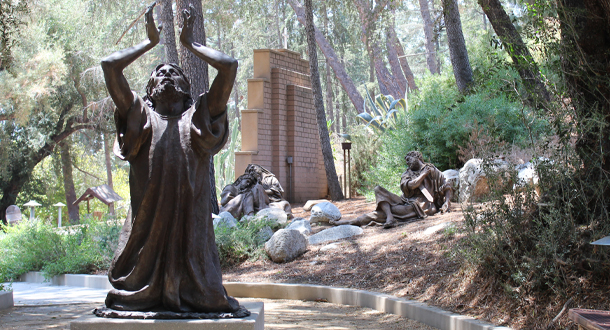
Scripture:
Wisdom 2:1a, 12-22
John 7:1-2, 10, 25-30
Reflection:
I am sure all of us are deeply troubled by the violent warfare now raging in Ukraine. The unprovoked aggression that prompted it, the terrible loss of human life, the wanton destruction of what were peoples’ homes. For some mysterious reason, violence goes hand in hand with human history.
The Bible affirms that at the outset of primal human history violence breaks out in our first human family when Cain out of jealousy kills his brother Abel. And all through biblical history, along with beauty and graciousness, there are enmity, wars, and murders.
This sober reflection (on April Fool’s Day, no less!) is prompted by the Scripture readings assigned for this Friday of the Fourth Week of Lent. The first reading is a famous reading from the Book of Wisdom (2:1, 12-11) about the assault on the “just” person by those who feel that his goodness and gentleness is an affront to them and puts their own vile behavior in a bad light. They mock his claim to have God as his Father and they plot to test his gentleness and patience by putting him to a shameful death.
Even though this text was written many decades before the life of Jesus, it is not surprising that the early Christians saw here a kind of prefigurement of Jesus’ own sufferings in his passion. In fact, the Gospel of Matthew directly quotes from this passage and places it on the lips of those who mock Jesus hanging in agony on the cross (see Mt 27:43). Jesus, too, was a just person, filled with gentleness and goodness; and Jesus, too, trusted in his Father’s love even in the face of hostility and death.
The same sober mood characterizes the gospel selection from John. This scene (John 7:1-2, 10, 25-30) is one of the most hostile encounters in the Gospel between Jesus and the religious authorities, whom John identifies simply as the “Jews.” Obviously, not all Jews at the time of Jesus were hostile to him—his own family and his disciples loved him, and Jesus drew crowds of his fellow Jews eager to hear him and to be healed by him.
But, nevertheless, Jesus did face some fierce opposition, not only from the religious authorities who were wary of him but also from the Romans who directly ruled Jerusalem and its surroundings. John’s Gospel notes that at the moment of Jesus’ arrest in Gethsemane, the armed men who seize him included a speiran—the Greek name for a cohort of Roman soldiers.
What is the point of all this? The Scriptures for this Eucharist remind us of something we see around us every day—the presence of violence and evil perpetrated by ruthless people. The Bible does not wink at the presence of evil or pretend it is not there. Instead, it reminds us that sin and death do not have the last word. We are approaching our celebration of Easter, the ultimate triumph of life over death in all its forms. Jesus for our sake absorbed violence and death and, through the power of his Father’s love, overcame it.
That is the Easter promise that protects us from despairing about the tenacious presence of evil in our world, whether in the cities of Ukraine or in the violence that walks our streets here at home.
Fr. Donald Senior, C.P. is President Emeritus and Professor of New Testament at Catholic Theological Union. He lives at the Passionist residence in the Hyde Park neighborhood of Chicago.
